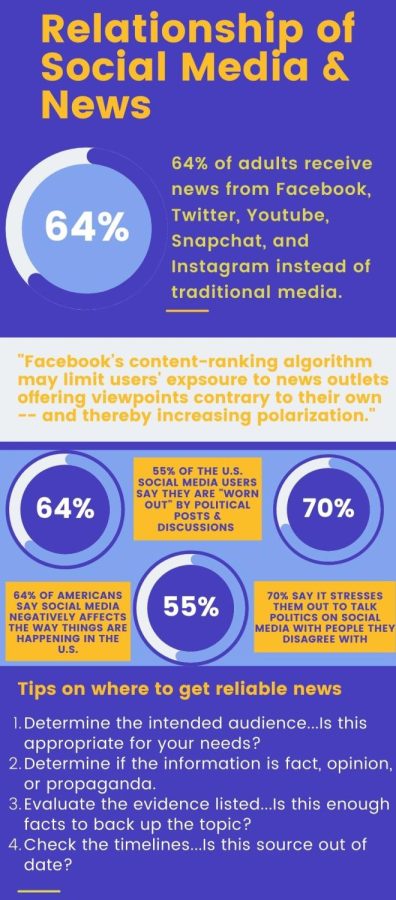Social Media Fuels American Polarization
Majority of adults get their news from social media rather than traditional media. While getting news from social media may be faster, it is not always reliable.
April 4, 2022
Does social media help progress ideas or just set people in conflict? Since there has been trend away from traditional news sources toward social media platforms, the idea of facts and dispassionate exchange of ideas and opinions has dissolved. While the prevalence of information is helpful, knowing what is true and appropriate ways to disagree or adapt thinking is lacking.
Rather than complain about the way things are, let’s look at the pros of news through social media outlets. The immediate access to news helps people stay aware of current developments and trending stories. According to Pew Research Center, 72% of the population is actively on social media and that number is only growing; the idea that people would not use the platform for information is naive. Social media can be an effective way to spread information as long as it’s done in an appropriate way.
A lack of exposure to different opinions causes a bigger divide between different political parties. Social media also gives a platform to have discussions between parties. “Hearing both sides, sometimes I will be with side a but then side b has some good points too, and I think maybe I should be on the other side,” Sasha Grant, junior, said. Knowing and being able to see both sides, not only makes people more educated on the topic but also allows for healthier discussions between both sides.
Social media can often breed unhealthy discussions. Grant said, “Anything and everything is on social media so people are going to say their opinion whether it’s right or wrong….no guidelines, too. It really affects it and makes counterparts attack each other.” If a person attacks another with their opinion, that may turn them make them disregard anything that person has to say because it was in an aggressive way.
Students seem to be going to social media, because it is “tangible and common,” Counselor at Pattonville Mr. Tate said. “People usually go to whatever platform they like, wether information is accurate or not, they tend to buy into it.”
Tate thinks that students are using social media more and more for news because “it has become a social norm.”
Devin Scharer, junior believes that “social media causes students to feel as though they can say whatever without any real consequences..traditional news sources you can have more organic conversations on topics.” Because of social media there are fewer conversations and more arguments, because people are hiding behind a screen. This produces a lot more bullying online as well, whether that’s over news and social issues or not. It’s a lot easier to say something controversial or mean to someone when there isn’t a screen barrier.
As social media grows in popularity, more people may look to non-credible social media accounts and spread news that is not necessarily true, without checking their facts.
Grant explained, “I started fact checking more because I would go around school saying this and that and the third someone will tell me that’s not true and I look it up and it’s not true. So it’s kinda embarrassing.” Social media spreads false information very easily since there is no fact checking within social media sites. Traditional news sources are required to fact check but social media isn’t. Grant said, “Fake news can start trending faster than real news: like a rumor goes around school so much more quickly.”
News from social media can cause untrue things to go around.
When someone gets information from social media, they can go on to spread this information to other people too, regardless of whether the information is true. It creates a trickling effect of a spread of false information.
As social media grows in popularity, so does the craving for instant information, regardless of the truth in the information. Today, it is incredibly important to fact check information found online. It is also important to have healthy discussions rather than mean arguments about topics in order to limit polarization in the United States.
For more information found in the infographic, visit Pew Research Center and Forbes.


